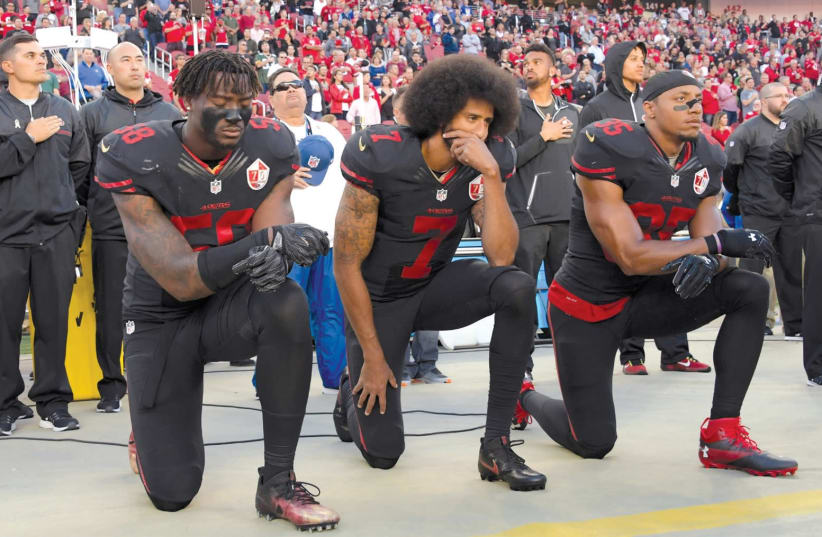Such protests – strictly prohibited in totalitarian regimes such as Saudi Arabia, China and North Korea – are routine in the democratic countries of the world.
But there are limits to freedom, as well.
America is now reeling from the growing protests at professional sports events. It began in 2016 when San Francisco 49ers’ quarterback Colin Kaepernick decided to kneel, rather than stand, at the singing of the national anthem, which precedes virtually all football, baseball and basketball games in America. Kaepernick was protesting racial injustice in the US, particularly the way blacks are treated by law-enforcement officials. Though Kaepernick’s career ended shortly thereafter – not because of his protest but because of his dismal performance on the field – his act of disobedience has now spread to stadiums throughout the country, fueled in part by President Donald Trump’s call for team owners to fire athletes who refuse to stand and honor their country.
Sport – effectively the religion of America – has been, along with war and national emergencies, one of the great unifiers of the population. Players come from every background, culture and creed, and the ballpark has been the one place to lay aside your problems and your politics and escape for a few hours of fun.
But now that the game has been politicized, fans are taking sides, either cheering on the demonstrators or boycotting the matches. Some have even publicly burned their season passes – worth several thousand dollars – to indicate their repugnance at the players’ behavior. They suggest that players – whose salaries last year averaged $1.9 million – should walk off the field without pay if they really are sincere in their grievances. The pregame cheers have become intermingled with boos, and sports’ beautiful bubble is in danger of bursting.
Now, I have always been an advocate for individual acts of civil disobedience. It was Thoreau who famously said that “men lead lives of quiet desperation,” and he urged civilians to act out of conscience, even if this results in some form of punishment. And so I will walk out of restaurants – even threatening not to pay the bill – that refuse to enforce antismoking ordinances, and I will not walk into establishments that have no entrance or restroom facilities for the handicapped. I will not yield the sidewalk to electric bikes that illegally ride there, and I routinely call out anyone who jumps the line at the bank, post office or bus stop. But what I will not do is punish my fellow citizens who have done nothing wrong at all.
Which brings me to Israel.
I am horrified by the recent decision of handicapped protesters to block highways and disrupt traffic. Their cause may be just, but there is a time-honored principle in Jewish law: No mitzva can be accomplished by means of a sin (the classic case is stealing another’s lulav (palm branch) and etrog (citron) and using them to fulfill the commandment of the Four Species. Pregnant women on the way to deliver, sick people going to their doctors, store owners who must open their businesses, and countless others who have to get somewhere are being disenfranchised, their precious time robbed by these selfish individuals. Just because someone feels he or she is not getting his fair share does not give them the right to deny me my freedoms, and sitting in a wheelchair does not exempt them from fine or imprisonment. What’s next? Disgruntled patients unhappy with their medical treatment cutting the electric wires in the hospital?
And then there is the Kotel. This was always the one place in Israel where you could come for a healthy dose of spiritual serenity. Though it was crowded – one of the most visited sites in the world – you always felt a certain peace when you were there, praying either alone or in a minyan, above the cacophonous noise of the outside world. But alas, no more. The controversy over who “owns” the Kotel has scarred and spoiled it.
I’m not taking sides between the women who innovatively want to read from the Torah there, or the women who have come for generations to pray quietly and read Psalms, commotion-free. I am saying that the protesters should have chosen some other spot – any other location, like a public square or park – to make their case. Or doesn’t God hear prayer anywhere and everywhere?
Today is the 15th anniversary of our eldest son Ari’s death in battle against Hamas terrorists. Anyone who has ever been in the IDF knows that it is not infallible. It is directed by human beings, and human beings make mistakes, and whenever there is a tragedy – be it in combat or training – there is always cause for hindsight and casting blame. When done in the proper fashion, this is appropriate, even constructive, as it may prevent future casualties. But to harm the institution of the army, which lets us sleep peacefully at night in a very dangerous neighborhood? Never.
“Justice, justice, you shall pursue,” urges our Torah. But, add the rabbis, be sure that you do not trample on others when pursuing it.
The writer is director of the Jewish Outreach Center of Ra’anana. jocmtv@netvision.net.il
